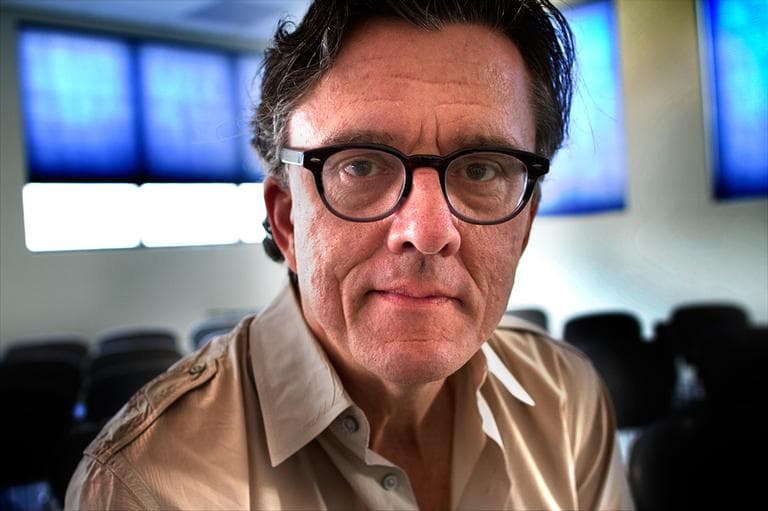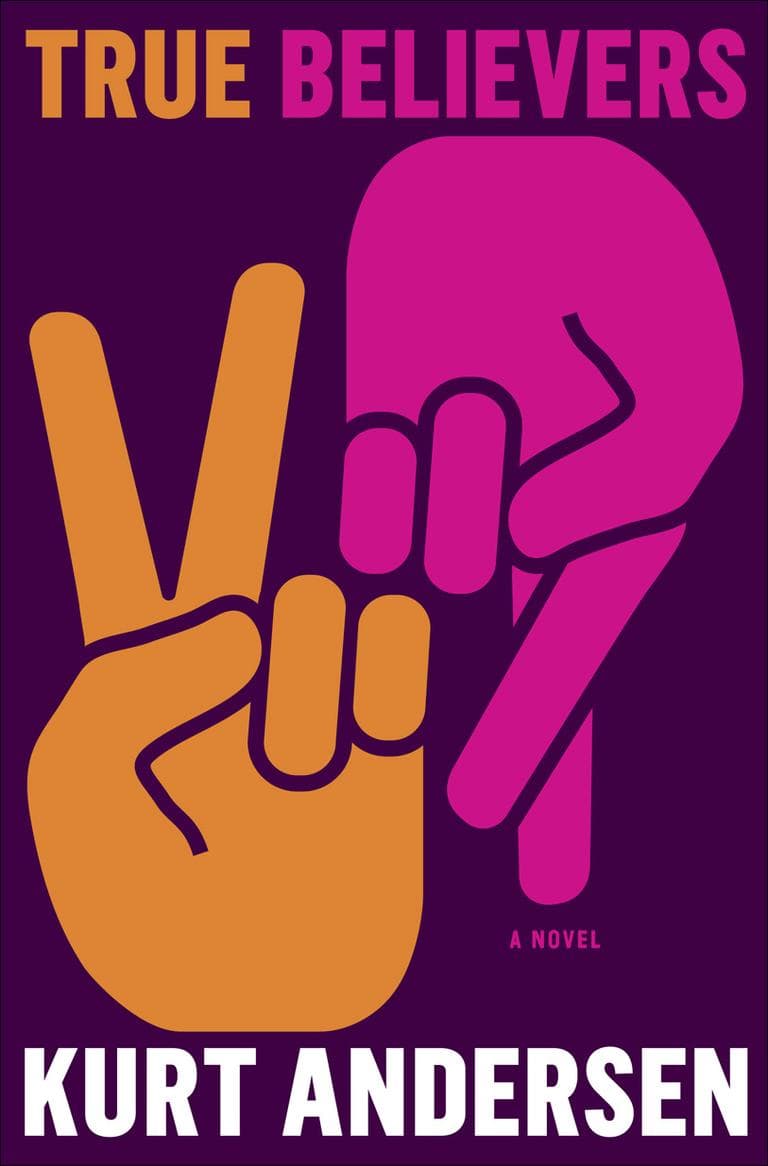Advertisement
Host Kurt Andersen Says '60s Perpetuated Social Change, And Selfishness
Resume
Author and public radio host Kurt Andersen created a ruckus in the New York Times, when, just in time for the July Fourth holiday, he published an op-ed that said that though the social and cultural upheavals of the 1960s produced some good things, there was a less savory result: "Individualism has been triumphant. Selfishness won," he says. The reaction was swift, and from all sides. "In addition to angering people who thought I was condemning the civil rights movement, I also had plenty of critics on the right who say, 'No! We're not selfish!'" Andersen told Here & Now's Robin Young. The conversation is excerpted below, and a selection from Andersen's book follows.
You asked, why did the 60s revolution win on the social and cultural fronts with the progress in women's rights, gay rights, a black president, etc.... But lose on the economic front with old-school, free market ideas gaining traction. You had an epiphany, which was?
Which was that people on the left tend to think of the 60s as their decade, when everything good began. And many great things began, like women's rights, Civil Rights, gay rights, none of which I'm saying are selfish.
But what also began are the more hedonistic aspects of the 1960s: You can dress any way you want and you can have a lifestyle you want. So the right, for the last 40 years, has demonized the 60s, [saying] "That's when everything went bad, that's when the culture got coarse."
But I suddenly realized that its not an incongruous contradiction that what began on the right as a result of this libertarian upsurge... and this I-can-do-whatever-I-want upsurge, was what became in the 80s and 90s and today this unfettered, market-worshipping era where anything I want to do to make a profit is fine.
The letters poured in. Here's one from Jeremy, of Brooklyn. He writes, "So Kurt Andersen lays today's corporate greed and the mega-indulgences of the one percent on the 1960's era hippies who gave us organic farming, the feminists who create rape crisis centers, and the gay activists championing basic human rights. A generation of free-market ideologues who hacked at regulations, unions and what was left of the New Deal plays no role in his account of the ascent of the corporate license to pollute, off-shore jobs and overpaid executives." In other words, yes, the financial collapse: Blame it on the hippies.
Not even the financial collapse. What I'm talking about is the larger cultural sense of old-fashioned, extreme free-marketism, and I'm not saying the hippies caused it. I'm saying that the late '60s, which we think of as having only one stream, the counter-culture, the liberal progessivism, had another stream which I believe is flowing like mad today.
- New York Times: The Downside Of Liberty, By Kurt Andersen
- New York Times: Are Americans Selfish?
The letters go on. Your critics say, 'Wait a minute, not all '60s celebrants were celebrating hedonism, many were celebrating social justice, doing things for other, selflessness.
Exactly, and I wasn't saying "the '60s, they're bad." I was saying, something shares a taproot in the 60s, both these things that people on the left love and celebrate, the personal liberty and do-my-own-thing movements which are with us today still, that they share this taproot in the sixties with economic libertarianism. And in fact, in addition to angering people who thought I was condemning the civil rights movement and the great achievements of the sixties, I also have plenty of critics on the right, libertarians who say "No, we're not jerks, we're not selfish. We're righteous in our beliefs in libertarianism." But I think there's a kind of headwaters where several rivers streamed out of.
They meet in your new book, "True Believers." Your heroine lives through the '60s and she remembers all of it: From JFK's assassination, to "slip-and-slide and silly putty, frisbees, instant tanning lotion.." Is this you remembering this, or is this you at Wikipedia?
This is me, certainly, thinking about that jazzy, zazzy part of the early '60s... then realizing there is, in addition to the solemn, serious crisis-filled idea of the sixties there was this non-stop fun aspect as well. I thought that was a way to sort of fire hose of references make that clear.
What are you saying about the '60s in the book? When we meet her, she's telling us this story that she's about to tell the world. She's now this 64, eminent law professor.
And trying to uncover and investigate and unravel the mystery. She doesn't really know all that happened to her and all that she did and what the consequences were, so in real time today she's trying to figure it out.
We don't want to give away the ending, but we will say that, as children, she and a couple of her male friends had tight bonds, and it was based on their love of James Bond. They would act out the movies that they loved as they got older and in college. There was actually a plot that went somewhat awry. What are you saying? We know there was anti-war violence in the '60s. There was also a lot of anti-Civil Rights violence.
We have read the memoirs of the famous weathermen and radicals who were fugitives and all that. I wanted to do a fresh take of people who were not-famous radicals who were only, in a certain way, briefly radicals and had this spectacular idea in mind to do, which went awry as you say, but which they all walked away from and lived their lives like you and I have lived for the last forty years and what that's like, and the 'getting away with it'. As I began writing it I began thinking, that's one of the things that could be said about that generation, the baby-boomer generation is, for so many of them, us, really people were able to have their cake and eat it, too; posture as revolutionaries and have a wild and crazy youth, but then lead comfortable and successful lives afterwards as well.
Book Excerpt: 'True Believers'
By: Kurt Andersen
 My publishers signed me up a year ago to write a book, but not this book. “A candid and inspirational memoir by one of the most accomplished leaders and thinkers of our times,” their press release promised. They think they’re getting a slightly irreverent fleshing out of my shiny curriculum vitae, a plainspoken, self-congratulatory chronicle of A Worthy Life in the Law and the Modern Triumph of American Women, which they’re publishing, ho-hum premise notwithstanding, because I’ve written a couple of best sellers and appear on TV a lot.
My publishers signed me up a year ago to write a book, but not this book. “A candid and inspirational memoir by one of the most accomplished leaders and thinkers of our times,” their press release promised. They think they’re getting a slightly irreverent fleshing out of my shiny curriculum vitae, a plainspoken, self-congratulatory chronicle of A Worthy Life in the Law and the Modern Triumph of American Women, which they’re publishing, ho-hum premise notwithstanding, because I’ve written a couple of best sellers and appear on TV a lot.By far the most interesting thing about my life, however, is nowhere in my résumé or official bio or Wikipedia entry. I’m not exactly who the world believes I am. Let me cut to the chase: I once set out to commit a spectacular murder, and people died.
But it’s not a simple story. It needs to be unpacked very carefully.
Like a bomb.
Trust me, okay?
I am reliable. I am an oldest child. Highly imperfect, by no stretch a goody-goody. But I was a reliable U.S. Supreme Court clerk and then a reliable Legal Aid lawyer, representing with all the verve and cunning I could muster some of the most pathetically, tragically unreliable people on earth. I have been a reliable partner in America’s nineteenth largest law firm, a reliable author of four books, a reliable law professor, a reliable U.S. Justice Department official, a reliable law school dean. I’ve been a reliable parent—as trustworthy a servant, teacher, patron, defender, and worshipper of my children as anyone could reasonably demand, and I think on any
given day at least one of the two of them would agree.
I was not an entirely reliable wife for the last decade of my marriage, although my late ex, during our final public fight, called me “reliable to a goddamned fault,” which is probably true. And which may be why the surprising things I did immediately afterward—grabbing his BlackBerry out of his hand and hurling it into a busy New York street, filing for divorce, giving up my law firm partnership, accepting a job that paid a fifth as much, moving three thousand
miles away—made him more besotted by me than he’d ever seemed before. As my friend Alex said at the time, “That’s funny—telling Jack Wu ‘Fuck you’ finally made him really want to fuck you.”
I am reliable, but I’m not making the case that reliability is the great human virtue. Nor am I even making the case that reliability is my great virtue. In fact, after four decades in the law, I’ve lost my animal drive for making cases for the sake of making cases, for strictly arguing one of two incompatible versions of the truth, for telling persuasive stories by omitting or twisting certain facts.
So I am not arguing a case here. I’m not setting out to defend myself any more than I am to indict myself. I’m determined to tell something like the whole truth—which, by the way, I don’t believe has ever been done in any American court of law. To tell the whole truth in a legal case would require a discovery process and trial that lasted years, hundreds of witnesses each testifying for many weeks apiece, and rules of evidence rewritten to permit not just hearsay and improperly obtained information but iffy memories of certain noises and aromas and hallucinatory hunches, what a certain half-smile or drag on a cigarette decades ago did or didn’t signify during some breathless three A.M. conversation.
From the Book, TRUE BELIEVERS by Kurt Andersen. Copyright © 2012 by Kurt Andersen. Reprinted by arrangement with Random House, an imprint of The Random House Publishing Group, a division of Random House, Inc. All rights reserved.
Guest:
- Kurt Andersen, author and public radio host of Studio 360
This segment aired on July 16, 2012.